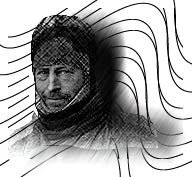![]()
 |
 |
Australian geologist Douglas Mawson had been asked to join Robert
Falcon Scott's fatal expedition to the Pole, but he had declined so that he could head his own. He'd already been part of Ernest Henry Shackleton's Nimrod expedition in 1908-9, and he secured substantial Australian government financial support. The Aurora sailed from Hobart in December 1911, and arrived at the ice in January 1912. Mawson set up his base at Cape Denison on Commonwealth Bay, unaware that he'd chosen perhaps the windiest place on Earth. Despite the significant charting and scientific achievements of Mawson's expedition, it is remembered for the ordeal that Mawson himself endured. |
| Mawson and two others, Mertz (a Swiss mountaineer and ski champion)
and Ninnis (a British soldier), set out on dog sledges from Cape Denison on November 10, 1912, hoping to explore far to the east of the base. By December 14, having crossed two heavily crevassed glaciers, they reached a point 500 km from their base, and that afternoon Ninnis fell down a seemingly bottomless crevass with his sledge, dogs, most of the party's food, the tent and all of the dog food. Mawson and Mertz headed immediately for home, battling hunger, cold, exhaustion and poisoning from the dog livers that they had eaten. |
BACK to Antarctica BACK Lonely Planet home page |
Mertz died on January 7 when they were still 160 km out from their
base. Mawson used a pocket knife to saw the remaining sledge in half to lighten his load, and he pushed onward. His body was falling apart: his hair was coming out, his toenails were loosening and the soles of his feet were sloughing off, and yet he made it back just in time to see the Aurora sailing off on the horizon. Six men had been left behind in the faint hope that the missing party might return. The Aurora was radioed, but heavy seas prevented the ship from reaching Cape Denison, so Mawson and the others were forced to spend another winter on Antarctica, arriving back in Australia in late February 1914. In 1929-31, Mawson was back in the Antarctic leading two summer voyages for the British, Australian and New Zealand Antarctic Expedition (BANZARE). |